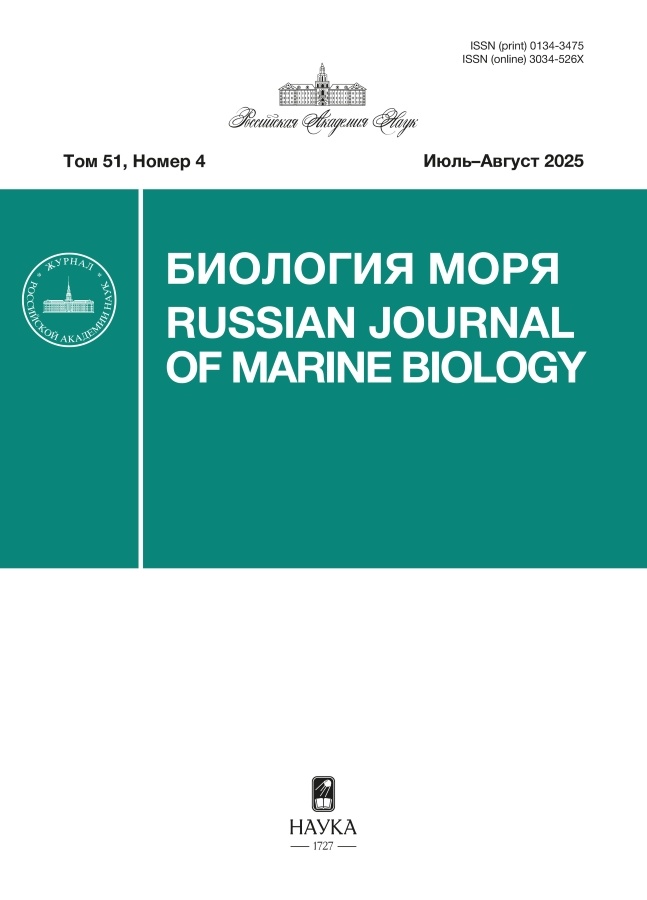Оценка влияния региональных климатических условий на численность горбуши oncorhynchus gorbuscha (walbaum, 1792) (salmonidae) японского моря в 1980–2023 гг.
- Авторы: Шатилина Т.А.1, Цициашвили Г.Ш.2, Осипова М.А.2,3, Радченкова Т.В.2
-
Учреждения:
- Тихоокеанский филиал ВНИРО (ТИНРО)
- Институт прикладной математики (ИПМ) ДВО РАН
- Дальневосточный федеральный университет
- Выпуск: Том 50, № 6 (2024)
- Страницы: 407-416
- Раздел: ОРИГИНАЛЬНЫЕ СТАТЬИ
- Статья опубликована: 24.12.2024
- URL: https://gynecology.orscience.ru/0134-3475/article/view/681340
- DOI: https://doi.org/10.31857/S0134347524060012
- ID: 681340
Цитировать
Полный текст
Аннотация
Рассмотрена зависимость динамики уловов горбуши Oncorhynchus gorbuscha (Walbaum, 1792) (Salmonidae) Японского моря от гидрометеорологических условий в районах нереста и нагула. Неблагоприятными условиями для возврата горбуши являются экстремально низкие температура воздуха в инкубационный период и температура воды в эстуарно-прибрежной стадии жизненного цикла. Благоприятными условиями для возврата горбуши являются высокие значения температуры воздуха в инкубационный период и температуры воды в Татарском проливе. С 2018 г. отмечалось похолодание вод в Татарском проливе, что негативно сказалось на возврате горбуши в реки Хабаровского и Приморского краев. Смена доминант в 1994 г. произошла при экстремальных гидрометеорологических условиях во все периоды жизненного цикла горбуши Японского моря.
Полный текст
Об авторах
Т. А. Шатилина
Тихоокеанский филиал ВНИРО (ТИНРО)
Автор, ответственный за переписку.
Email: tarad@yandex.ru
ORCID iD: 0009-0005-7954-9745
Россия, Владивосток
Г. Ш. Цициашвили
Институт прикладной математики (ИПМ) ДВО РАН
Email: tarad@yandex.ru
ORCID iD: 0000-0003-2600-0474
Россия, Владивосток
М. А. Осипова
Институт прикладной математики (ИПМ) ДВО РАН; Дальневосточный федеральный университет
Email: tarad@yandex.ru
ORCID iD: 0000-0001-5615-9449
Россия, Владивосток; Владивосток
Т. В. Радченкова
Институт прикладной математики (ИПМ) ДВО РАН
Email: tarad@yandex.ru
ORCID iD: 0000-0003-2287-975X
Россия, Владивосток
Список литературы
- Гаврилов Г.М., Пушкарева Н.Ф. Динамика численности приморской горбуши // Изв. ТИНРО. 1996. Т. 119. C. 178−193.
- Глубоковский М.К., Животовский Л.А. Популяционная структура горбуши: система флуктуирующих стад // Биол. моря. 1986. Т. 2. С. 39−44.
- Горяинов А.А., Крупянко Н.И., Шатилина Т.А. Сравнительный анализ динамики уловов приморской и амурской горбуши // Бюлл. № 8 изучения тихоокеанских лососей на Дальнем Востоке. 2013. С. 106−118.
- Горяинов А.А., Шатилина Т.А. Динамика азиатской горбуши и климатические изменения над азиатско-тихоокеанским регионом в ХХ веке // Биол. моря. 2003. Т. 29. № 6. С. 429−435.
- Горяинов А.А., Шатилина Т.А. Океанологические основы распределения, миграций и динамики численности лососей в Японском море. Гидрометеорология и гидрохимия морей. Японское море. СПб.: Гидрометеоиздат, 2004. Т. 8. № 2. С. 175−201.
- Иванков А.М. Причины периодических и ежегодных флюктуаций численности и изменений биологических признаков горбуши Южных Курильских островов // Вопр. ихтиологии. 1984. Т. 24. № 6. С. 895−906.
- Котенев Б.Н., Кровнин А.С., Кловач Н.В. и др. Влияние климато-океанологических факторов на состояние основных запасов горбуши в 1950−2015 гг. // Тр. ВНИРО. 2015. Т. 158. С. 143−161.
- Лысенко А.В., Шатилина Т.А., Гайко Л.А. Влияние гидрометеорологических условий на динамику вылова (численности) приморской горбуши Oncorhynchus gorbuscha (Salmonidae) на основе ретроспективных данных (Японское море, Татарский пролив) // Вопр. ихтиологии. 2021. Т. 61. № 2. С. 206−218.
- Мороз В.В., Шатилина Т.А., Рудых Н.И. Формирование аномальных термических режимов в северной части Татарского пролива и Амурского лимана под воздействием атмосферных процессов // Вестн. ДВО РАН. 2021. № 6. С. 101−110.
- Назаров В.А., Лысенко А.В. Итоги лососевой путины 2018 г в Приморском крае // Бюлл. № 13 реализации “Концепции Дальневосточной бассейновой программы изучения тихоокеанских лососей”. 2018. С. 240−254.
- Пушкарева Н.Ф. Состояние запасов приморской горбуши и пути увеличения ее численности // Тр. ВНИРО. 1975. Т. 106. С. 106−113.
- Радченко В.И., Рассадников О.А. Тенденции многолетней динамики запасов азиатских лососей и определяющие ее факторы // Изв. ТИНРО-Центра. 1997. Т. 122. С. 72−92.
- Рикер У.Е. Методы оценки и интерпретации биологических показателей популяций рыб. М.: Пищевая промышленность. 1979.
- Семенченко А.Ю. Приморская горбуша (Oncorhynchus gorbuscha) в прибрежный и речной периоды жизни. Часть 1. Динамика численности // Бюлл. № 1 реализации “Концепции Дальневосточной бассейновой программы изучения тихоокеанских лососей”. 2006. С. 98−114.
- Спичкин В.А. Определение критерия крупной аномалии // Тр. ААНИИ. 1987. Т. 402. С. 15−20.
- Шапиро А.П., Луппов С.П. Рекуррентные уравнения в теории популяционной биологии. М.: Наука, 1983. 132 с.
- Шунтов В.П., Темных О.С. Тихоокеанские лососи в морских и океанических системах. Т. 2. Владивосток: Изд-во ТИНРО-Центра, 2011. 473 с.
- Beamish R.J., Bouillon D.R. Pacific salmon production trends in relation to climate // Can. J. Fish. Aquat Sci. 1993. V. 50. P. 1002−1016.
- Tsitsiashvili G., Shatilina T., Osipova M., Radchenkova T. Limit cycles of length two in the Riсker model and their application in fishing // Reliab.: Theory Appl. 2024. V. 1. № 77. P. 790−795.
Дополнительные файлы


















